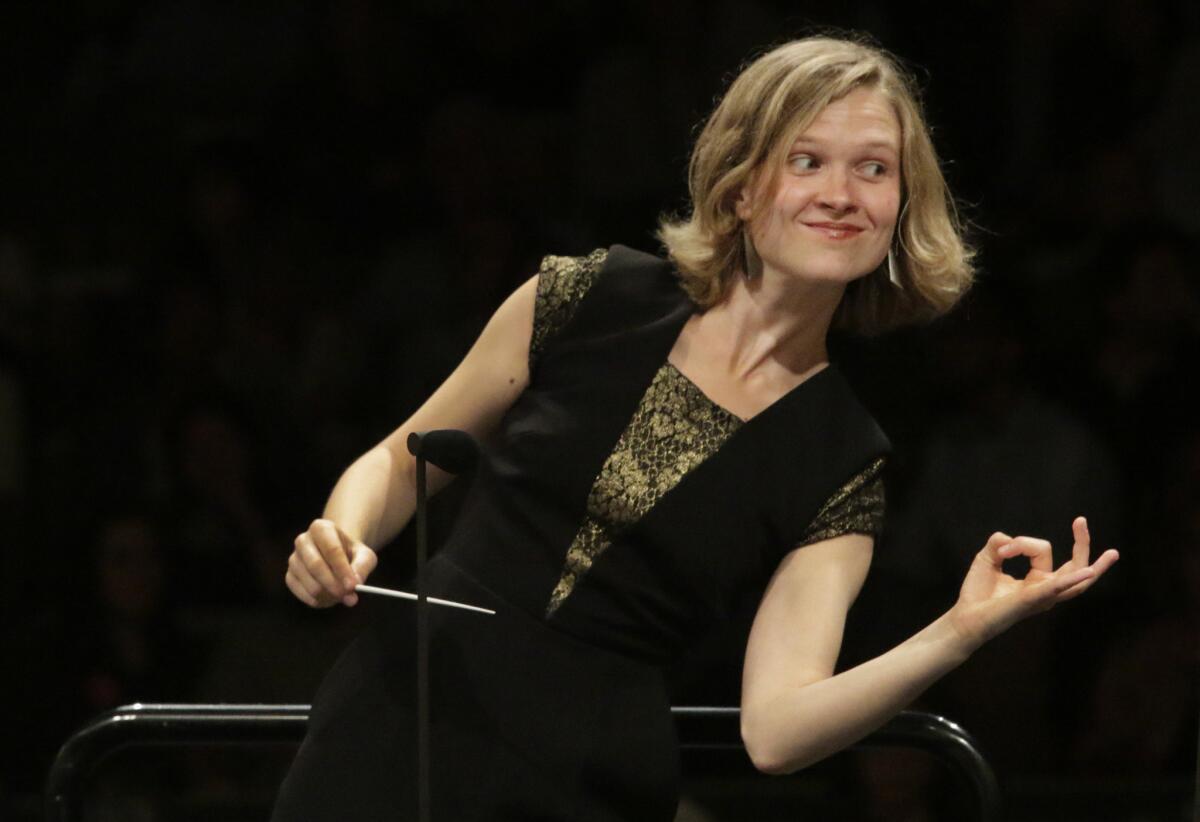Review: Conductor Mirga Grazinyte-Tyla brings her magic back to the Bowl

Mirga GrazinytĂŠ-Tyla conducts the L.A. Philharmonic at the Hollywood Bowl on Aug. 20, 2015.
Last summer a star was born at the Hollywood Bowl. A 28-year-old Los Angeles Philharmonic assistant conductor from Lithuania made her debut in the amphitheater with a performance of Mahlerâs First Symphony so vivid that some kind of musical sorcery seemed involved. On Thursday night, Mirga Grazinyte-Tyla was back at the Bowl.
Itâs been an important year for Grazinyte-Tyla. In March, she confirmed first impressions with rhythmically riveting L.A. Phil performances of Stravinskyâs âPetrushkaâ and Beethovenâs Seventh Symphony at Walt Disney Concert Hall. Already known as simply Mirga, she has attracted interest throughout the orchestra and opera world and has just become music director of the Salzburg State Theatre. She has an upcoming debut with the San Diego Symphony, which is currently in a music director search.
SIGN UP for the free Essential Arts & Culture newsletter >>
Having no intention of letting her get away just yet, the L.A. Phil last week promoted Grazinyte-Tyla to associate conductor. Still, a conducting career is built on long years of apprenticeship, and Grazinyte-Tyla is not yet completely past the grunt work. Her task Thursday was to bring some fresh energy into late-summer L.A. Phil doldrums.
The woodwinds and brass had the night off in a program for string orchestra and percussion, as did the principal players. Alexandra Soumm, a young Russian violinist not yet well known, was the soloist in Leonard Bernsteinâs Serenade. The other work, Rodion Shchedrinâs âCarmen Suite (After Bizet),â is not a score to be taken terribly seriously.
Written in 1967 for the composerâs wife, the famed ballerina Maya Plisetskaya, the suite â which employs a large array of percussion instruments colorizing famous parts of âCarmenâ (as well as various other Bizet bits and pieces) â and the provocative ballet immediately ran afoul of the humorless Soviets. After all, bongo punctuations and various satiric percussive pops border on Spike Jones, the wacky 1950s bandleader.
However, Shostakovich, the most important Soviet composer, found the dance particularly sexy. For a while this became Shchedrinâs one well-known score internationally, favored especially on pop programs. Now it can seem a relic.
Grazinyte-Tyla, who will be conducting a production of the real âCarmenâ next season with her small Salzburg company and with Berlinâs avant-garde Komische Oper, did something surprising. She sought out unsuspected elegance in the score. Instead of allowing the percussion to overwhelm, she extracted delicacy. The eloquent chimes at the opening created an arresting atmosphere of melancholy beauty.
It makes all the difference to have a woman lead this ballet score. A lithe conductor, rhythmically electric, Grazinyte-Tyla all but danced and, with the assistance of lingering video close-ups on the Bowlâs large screens, became Carmen. Shchedrinâs sarcasm was tamed. His male gaze was counterbalanced by an often coy conductor who made every bar her own. Musical guffaws were turned into sophisticated wit. Her wry smile and utter control would have likely freaked out the Soviets far more than the egregious sexuality they pretended to disapprove of.
But Iâm not sure the Soviets would have had too much of a problem with the undersexualized performance of Bernsteinâs Serenade, a five-movement concerto for solo violin, strings, harp and percussion. Written in 1954, just as Bernstein was starting on âCandideâ and âWest Side Story,â it explores sexuality in a far different form than either Bizet or Shchedrin did. Bernsteinâs stimulus was Platoâs âSymposium,â with its discussions of love.
A biography could be written about Bernstein and love, his sentimentality, his huge heart yet monstrous appetite, his anguished and also vivacious bisexuality, his late-night insecurity. Love is a subject he treats with enormous erudition, startling self-analysis and exceptional musical vitality. Too in your face, Serenade made some early critics nervous. Critic Alan Rich memorably, if unfairly, dismissed the premiere as a dinner party spent nibbling on âdietetic cotton candy.â
Itâs unadulterated cotton candy â delicate, sweet, ethereal and, most of all, changeable. A heavy hand, or bow, will turn it into sticky goo.
A robust violinist, Soumm played the solo part on a grand scale that was all artery-clogging bad cholesterol, as though it were another meat-and-potatoes Russian violin concerto. For her part, Grazinyte-Tyla was ever agile with Bernsteinâs changing meters. She caught the flavor of the jazz elements. She kept texture lean and lucid.
But with little Bernstein swagger and songfulness in the solo, there was little to be done other than hold this Serenade together. Grazinyte-Tyla next conducts the L.A. Phil in December with a strong violin soloist in Hilary Hahn, and the conductor will also turn to a neglected 20th century Russian composer, Mieczyslaw Weinberg, currently having a major revival.
More to Read
The biggest entertainment stories
Get our big stories about Hollywood, film, television, music, arts, culture and more right in your inbox as soon as they publish.
You may occasionally receive promotional content from the Los Angeles Times.











